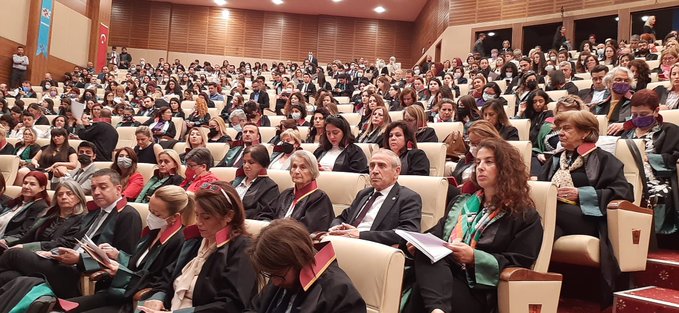Academics Özlem Altiok writes on the patriarchal backlash against women’s hard-won rights in Turkey, and how the women’s and LGBTI+ movements refused to give up and continue to struggle for the Istanbul Convention.

Özlem Altıok / Transforming Society
Imposing in its security detail rather than through any architectural distinction, the Council of State (Danıştay), Turkey’s highest administrative court, is meant to provide a check on the executive branch. Following President Erdogan’s decision to withdraw from the Istanbul Convention, the court has become an unlikely focus for feminist activism in Turkey.
The Istanbul Convention is the short name for the Council of Europe Convention on preventing and combating violence against women (VAW) and domestic violence. It is a regional treaty concerning fundamental human rights, obligating states to establish comprehensive national legal and educational systems to realise gender equality in order to prevent VAW. The Istanbul Convention is to Europe what the Belém do Pará Convention is to South America.
Ironically, the Convention was opened to signature in Istanbul, and Turkey was the first country to sign it. When a high-ranking member of the ruling party uttered the possibility of withdrawal in July 2020, women and LGBTI+ activists were shocked and immediately gathered (virtually) to assess the threat and defend the Convention. At the height of the pandemic, and given the restrictions on the freedom of movement and association in Turkey, they drew on two resources to coordinate a response and strategy. First, they built on existing networks and practice of working together in solidarity. Second, they exploited the possibilities of Zoom.
Zoom meetings became a place to cope, learn and organise, where women would meet ‘face to face’ to discuss the increase in and intensification of VAW, and develop public campaigns against the government’s anti-woman policies. These Zoom meetings gave birth to some new organisations such as Women’s Platform for Equality (EŞİK), established to counter the systematic attacks on women’s hard-won rights.
How could a state that was the first to sign this Council of Europe treaty, seen as the gold standard in preventing violence against women, leave it? How could Turkey, where at least three women are murdered each day, justify withdrawing from an international treaty affirming women’s most fundamental human right – to live and to live free from violence? How could Turkey withdraw given that its parliament had voted unanimously to ratify the Convention in 2012?
Most importantly, how could we prevent this from happening? In addition to organising a major campaign to raise awareness of the potential withdrawal from the Convention, EŞİK activists started meeting opposition leaders over Zoom. These political leaders (all men) thought that the government could not afford to make such an unprecedented and scandalous move.
The President’s decision to withdraw from the Istanbul Convention was published in the Official Gazette in the small hours of 20 March 2021. The justification for the decision came two days later, as an afterthought, in the form of a statement from the Presidency’s Directorate of Communications:
“The Istanbul Convention, originally intended to promote women’s rights, was hijacked by a group of people attempting to normalize homosexuality – which is incompatible with Türkiye’s social and family values. Hence the decision to withdraw.”
It is hard to think of a more terrifying reason, with more terrifying implications, for the future of other human rights treaties, including the European Convention of Human Rights, Lanzarote Convention and CEDAW.
The purpose of the Istanbul Convention is to prevent and combat VAW. The Convention does not make any specific reference to LGBTI+ rights. A tangible product of decades of feminist activism, the Istanbul Convention does specify that gender inequality is a root cause of VAW and obligates states to take specific measures and take them without discrimination (Article 4.3)
Could anyone argue that the state should protect some victims of gender-based violence and not others?
Of course, the women’s and LGBTI+ movements in Turkey accepted neither the withdrawal decision nor the stated reason for it. They have used all the available means to defend the Istanbul Convention and their hard-won rights. Skillfully using Zoom and social media platforms, women declared the decision null and void. Moving from Zoom to the streets in June 2021, in the midst of a raging pandemic, they organised a protest in Istanbul where many met each other in person for the first time. Having called on the Council of Europe to investigate the legality of Turkey’s action, women also demanded that their country’s highest administrative court place a stay on the President’s decision. Women’s, and other civil society organisations, and bar associations around Turkey filed more than 200 lawsuits against the President’s unlawful decision.
In April and June 2022, the court hearings for these cases brought hundreds of feminist lawyers and women’s rights defenders into the Council of State. The hearings were historic events.
You can read the full article here.

